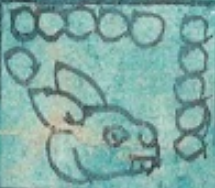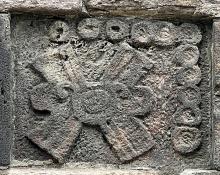Matlactli Once Tochtli (Mdz2r)
This combined simplex glyph and notation for a year date that comes from the Codex Mendoza involves a rabbit (tochtli) head in profile, facing toward the viewer's right. Surrounding the head are groups of ones or circle-shaped counters. One grouping is a horizontal row of five ones across the top of the box that contains this date. Another grouping includes five ones again running vertically down the right side of the box. There is a slight separation between these two groups. Finally, a single one appears on the left side of the box, again with a slight separation, just below the left-most circle of the horizontal row. The entire box is painted turquoise (xihuitl) blue with underlines the fact that this is a year [also xihuitl) date. So, year and turquoise are homophones, and therefore the paint might be interpreted to be a phonetic indicator for the word "year."
Stephanie Wood
The notation system involves groups of ones that can be seen as a mathematical equation. In other words 5 + 5 + 1 (in which ever order they are meant to be read, left to right or right to left) equals 11. The two separations between groupings of one provide a sort of visual ligature that would be interpreted as the plus signs in the equation. That said, the word in Nahuatl is literally ten plus one, with only one alphabetic ligature ("on").
Stephanie Wood
c. 1541, or by 1553 at the latest
xiuhpohualli, año, turquesa, xihuitl, years, calendars, mahtlactli
This example of a carved stone hieroglyph representing the date Matlactli Once Olin (Eleven Movement, or 11-Movement, or Earthquake) divides the number eleven in a way similar to the glyph for Eleven Rabbit, above. In other words, the circles that represent ones are grouped, with a visual division that sets the final one in the equation apart. This grouping of five, plus five, plus one shows the mathematical thinking behind the notation. Except for the volutes on each side of the central circle, the olin sign is reminiscent of one in the Codex Mendoza, https://aztecglyphs.wired-humanities.org/content/olin-mdz40r. The stone carving shown here is located on the Templo Calendárico at the Tlatelolco archaeological site. Photo by R. Haskett, 2 May 2025.

matlactli, ten, https://nahuatl.wired-humanities.org/content/matlactli
tochtli, rabbit, https://nahuatl.wired-humanities.org/content/tochtli
Codex Mendoza, folio 02 recto, https://digital.bodleian.ox.ac.uk/objects/2fea788e-2aa2-4f08-b6d9-648c00..., image 14 of 188.
The Bodleian Libraries, University of Oxford, hold the original manuscript, the MS. Arch. Selden. A. 1. This image is published here under the UK Creative Commons, “Attribution-NonCommercial-ShareAlike 3.0 License” (CC-BY-NC-SA 3.0).

